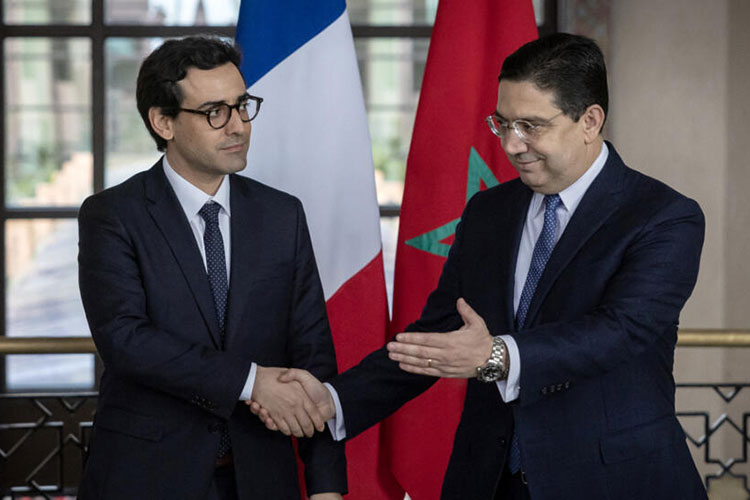French Foreign Minister Disappoints the Moroccan Regime in Rabat

The French authorities avoided the recklessness that the Spanish Prime Minister, Pedro Sanchez, fell into during his recent visit to the Kingdom of Morocco.
During his visit on Monday to Rabat, the French Minister of Europe and Foreign Affairs, Stéphane Séjourné, was disciplined in his movements and reserved in his statements in a way that did not leave any outlet for the media to manipulate the results of the visit.
Sejourné’s visit was not announced in advance, but rather came one day later than the date provided by some media sources, while Agence France Presse said that the two ministers would meet for a “working lunch.”
According to the same source, the head of French diplomacy renewed Paris’s “clear and continuous” support for the autonomy plan presented by the Moroccan regime in Western Sahara and expressed his desire to make progress on this issue, which Rabat considers to be its lens through which it determines its partnerships, as Moroccan King Mohammed VI said.
Relations between France and the Moroccan regime are experiencing a state of polar cold that they have not witnessed since 1965, following the liquidation of the Moroccan opposition figure, Mehdi Ben Barka, by a Zionist intelligence cell, the Mossad, at the request of the former monarch, Hassan II. Those familiar with the secrets of relations between Paris and Rabat attribute the reason to Moroccan intelligence espionage on the phone of the French President, Emmanuel Macron, via the Zionist “Pegasus” spyware. Those close to the Moroccan regime attribute the reason to the lack of development in the French position on the Western Sahara issue.
In this context, the French minister said during a press conference alongside his counterpart Nasser Bourita; “It is an existential issue for Morocco (meaning Western Sahara). We know that (…). It is time to move forward. I will personally take care of that,”. The French foreign minister already said that in previous interviews with a French newspaper, a German newspaper, and a Polish newspaper about two weeks ago.
France is considered the first country to support the autonomy plan presented by the Moroccan regime, and that was in 2007, during the era of the right-wing president convicted in many corruption cases, Nicolas Sarkozy, but its position on the Western Sahara issue did not develop as the Alawite Kingdom had hoped, according to Moroccan observers, compared to the Spanish position.
France, during the era of the current president, Emmanuel Macron, is trying to stand on the balance, without siding with any of the two arch-neighbors, Algeria and Morocco, to avoid losing one of them. However, the Alawite regime considers France a strategic and traditional ally and does not accept a neutral position from it, because Paris during the era of the former president, Giscard d’Estaing, stood with Rabat with military force in its war against the Sahrawi people, who demanded their right to self-determination.
Therefore, the Moroccan regime is pressurizing today, with the support of the Zionist lobby, after normalization with the usurping entity, to push France to follow in the footsteps of Spain, but Paris realizes that any such step will undoubtedly lead to the destruction of what remains of relations with Algeria and insists on staying at the same distance from both parties.
Although Paris did not back down from its declared position during the era of the right-wing president, Nicolas Sarkozy, it did not develop it and remained supportive of the plan, while Rabat expects more involvement from Paris, according to many observers, by adding a phrase such as “the most serious, credible and realistic solution,” which is the detail that Paris currently has reservations about, which frustrated the hopes of officials in the Moroccan regime, who cheered for a developed French position immediately after the recent statements of Stéphane Séjourné.
This frustration can be felt in some of the headlines that topped Moroccan newspapers covering the visit, such as “normalizing relations still requires a lot,” while the French official’s features indicated a lot of discomfort.






